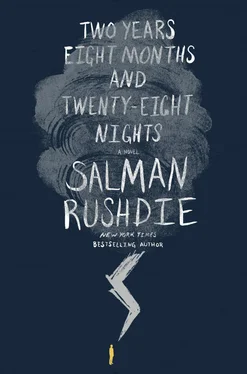Jinni great and jinni grand,
Now I hold you in my hand.
Tell me ere I set you free
What reward you’ll offer me.
A miniaturized jinni speaking through glass sounds like a talking mouse in a cartoon. Many human beings have been deceived by this feeble squeakety-squeak into swallowing the poisoned pill the captured jinni will invariably offer them. Ghazali was made of sterner stuff. He heard the jinni out:
Never bargain. Let me go.
Weak men bargain. Strong men know
Those who freely set me free
Evermore will blessed be.
Ghazali knew the proper retort to this childish deception.
Well I know your tribe and kin!
Make your promise while you’re in!
Without a sacred vow to keep
Only fool lets jinni leap.
Zumurrud Shah, knowing he had little choice, offered the usual three-wishes formula. Ghazali replied, sealing the contract, accepting in words that deviated somewhat from the usual formula.
Any time, neath any moon,
I may ask you for a boon.
Any time, these one two three
Swiftly will fulfillèd be.
Released, expanding at once to his full immensity, the jinni was struck by two things that marked out Ghazali as a most unusual mortal. Firstly, he did not quail. Quailing — as young Jimmy Kapoor was to discover centuries later — was not only de rigueur, it was also, in most cases, the instinctive reaction to the sight of Zumurrud in his dark glory. However, “this mortal,” the Grand Ifrit noted with some perplexity, “quaileth not.” That was firstly. And secondly, he didn’t ask for something right away! That was unprecedented. Infinite wealth, a bigger sexual organ, unlimited power … these wishes were at the top of any jinni’s list of the top demands of the human male. The human male wishing mind was surprisingly unimaginative. But no wish ? The deferral of all three wishes? That was almost indecent. “You ask for nothing ?” Zumurrud Shah roared. “Nothing is a thing I cannot give.” Ghazali inclined his philosopher’s head and put a hand around his chin. “I see that you give to nothing the quality of a thing. Nothing is the thing that cannot be given precisely because it is not a thing, yet in your view it’s not-thingness is itself a form of thingness. This, perhaps, we may discuss. Understand, jinni, that I am a man of few personal needs. I need neither infinite wealth, nor a bigger sexual organ, nor unlimited power. However, the time may come when I ask for some larger service. I’ll let you know. In the meantime, be off. You’re free to go.”
“When will this time come?” Zumurrud Shah demanded. “I’m going to be busy, you know. After being stuck in that bottle for so long there are many things to be done.”
“The time will come when it’s time,” Ghazali said, infuriatingly, and turned away to his book. “I spit upon all philosophers,” Zumurrud Shah told him, “also artists, and the rest of humanity as well,” and he whirled himself into a funnel of rage, and was gone. And then time passed, years passed, decades passed, and Ghazali was dead, and with him died the contract, or so the jinni believed. And the slits between the world silted up, and closed, and Zumurrud in Peristan which is Fairyland forgot for a time all about the world of men, all about the man who refused to make a wish; and centuries passed, and a new millennium began, and the seals which separated the worlds began to break, and then boom! Here he was again in the world of these feeble beings, and suddenly there was a voice in his head commanding his presence, the voice of a dead man, the voice of dust, of less than dust, the voice of the void where the dust of the dead man had been, a void that was somehow animated, somehow possessed of the sensibility of the dead man, a void that was ordering him to present himself to be told its first great wish. And he, having no option, being bound by the contract, even though he intended to argue that the contract did not apply posthumously, he remembered Ghazali’s unusual language, any time, neath any moon, any time these one two three, and he knew that as he had forgotten to insert a death clause (a detail he should make it a point to remember if at any point in the future he needed to grant the three-wishes contract again!), the obligation still lay upon him like a shroud, and he had to do whatever the void desired.
He remembered and summoned up in a rush all his unassuaged rage, the wrath of a Grand Ifrit who has spent half an eternity bottled up in blue, and conceived the desire to be avenged against the entire species from which his captor came. He would rid himself of this puny obligation to a dead man, and then it would be time for vengeance. This, he swore.
Regarding the rage of Zumurrud Shah: in the sixteenth century a group of brilliant Indian court artists in the employ of the Grand Mughal, Akbar the Great, had belittled and offended him. Four hundred and forty years ago, give or take, he appeared several times in the Hamzanama sequence of paintings depicting the adventures of the hero Hamza. Here Zumurrud is — here in this picture! — with his cronies, Ra’im Blood-Drinker and Shining Ruby, plotting their next evil move. Whisper whisper cackle hiss. An orange and white canopy above them, and behind them a mountain made of puffy boulders like stone clouds. Men with long-horned bullocks kneel, swearing fealty, or maybe just swearing, because Zumurrud Shah in person is a sight scary enough to make good men use bad language. He is a monster, is a terror, is a giant, ten times bigger than anyone else and twenty times nastier. Light skin, long black beard, ear-to-ear grin. A mouthful of man-eater teeth, mordant as Goya’s Saturn. And yet the painting slights him. Why? Because it depicts him as a mortal. A giant, certainly, but no jinni. Blood and flesh, not smokeless fire. Quite an insult to hand a Grand Ifrit.
(And, as events would show, he was not the Grand Ifrit with a taste for human flesh.)
In the paintings made by the brilliant artists assembled at Akbar’s jeweled court, there are several images of horrible Zumurrud Shah, but few that show him triumphant. Most often he is the defeated opponent of Hamza, the semi-mythical hero. Here he is along with his soldiers fleeing from Hamza’s army on his famous flying urns. Here, ignominiously, he has fallen into a hole dug by some gardeners to catch people who have been robbing their fruit groves, and is being badly beaten by the angry horticulturists. In their eagerness to glorify Hamza the warrior — and, through his fictional figure, the real-life emperor-hero who commissioned the pictures — the artists give Zumurrud Shah a hard time. He’s big, but a boob. Even the magic of the airborne urns is not his; they are sent to fly him to safety from Hamza’s attacks by his friend the sorcerer Zabardast. This Zabardast, which is to say “Awesome,” is and was like Zumurrud Shah one of the mightiest members of the tribe of the dark jinn; a sorcerer, yes, but one with special gifts regarding levitation. (And snakes.) And had their true nature been revealed by the Mughal court artists, they would have given Hamza a far tougher fight than he actually got.
That was one thing. But even if the Mughal painters had not misrepresented him Zumurrud Shah would still have been the enemy of the human race because of his contempt for human character. It was as if he took the complexity of human beings as a personal affront, the maddening inconsistency of human beings, their contradictions which they made no attempt to wipe out or reconcile, their mixture of idealism and concupiscence, grandeur and pettiness, truth and lies. They were not to be taken seriously any more than a cockroach deserves serious consideration. At best they were toys; and he was as close as any of them would ever get to a wanton god, and he would, if he so chose, kill them for his sport. In other words, even if the philosopher Ghazali had not unleashed him upon the unsuspecting world, he would have unleashed himself upon it. His inclination was in accordance with his instructions. But the instructions from the dead philosopher were clear.
Читать дальше












